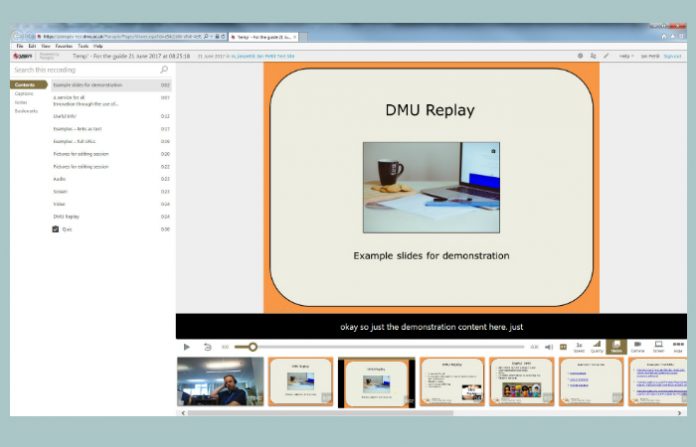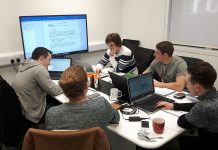Using tech to provide ways to make teaching and learning more accessible has won De Montfort University admiring words from government. Abigail Moriarty explains how DMU Replay works and why it doesn’t only aid students with disabilities.
In 2016, the government announced a series of changes to the way disabled students could access support in higher education. In short, it meant that universities would take on a lot more of the provision of help for students with disabilities.
At De Montfort University we saw this as an opportunity to create a tailored network of support for our students, which builds on DMU’s strengths as a diverse and welcoming university. We called this initiative ‘universal design for learning’ (UDL), and it provides all students with a variety of ways of engaging with their learning and teaching experience, making sure lecturers account for the different learning styles of individual students wherever possible.
One of the key elements of the UDL is DMU Replay. DMU Replay provides students with an online resource of audio and visual content relating to their academic-led sessions alongside access to any learning materials that are provided to further support their learning. It works as a revision resource for all students as well as support those with different learning needs and styles. These can range from international students for whom English is not a first language, to students with a specific learning difference or disability.
Data helps staff pinpoint areas of student difficulty
DMU Replay was introduced in October 2016 and has proved to be an overwhelming success. The most recent figures of DMU Replay material show that it had over 400,000 views since its launch, with expediential student uptake seen around assessment periods. Staff can access the analytics to see which particular sections of the sessions students are revisiting, therefore allowing them to use the material in a flip-classroom scenario in subsequent years.
It also means that students can revise taught material in the way which suits them best, whether it’s replaying a recording of a class or adapting written material shared in class using specialist software. This can be helpful for many different students including those with various learning challenges such as dyslexia.
In light of the positive responses to the tool, the university has committed to roll out DMU Replay policy to all students from September 2017, which is two years ahead of the original planned date.
Programme underpins the universality of learning at DMU
Keira Rounsley, outgoing vice-president welfare and community at De Montfort Students’ Union, said: “It makes learning not only more inclusive, but more fun. I’m very proud to be from a university that is really proactive in making sure the student experience is the best it can be.”
DMU offers comprehensive staff development, training and resources on UDL and the use of DMU Replay to enable a consistent and excellent student experience. That said, an evaluation framework is being established to determine whether DMU Replay and UDL are having a positive impact on student attainment, progression and achievement.
It works as a revision resource for all students as well as support those with different learning needs and styles.
UDL as a whole was named runner-up in 2017’s Guardian University Awards in the student diversity and widening participation category. Our approach also won praise from the department for education (DfE).
Georgina Watts, team leader, Disabled Students’ Allowance at the Department for Education, said: “I was impressed with the proactive approach DMU is taking in response to the disability support act (DSA) changes and the embedding of inclusive practice.
“As a result, the department has invited the university to be involved in developing approaches to engage the sector in implementing similar changes”.
We see UDL as a blueprint underpinning the universality of learning at DMU, not solely focused on those students with learning differences or disabilities, but a social model of learning that embeds anticipatory adjustments for all.








